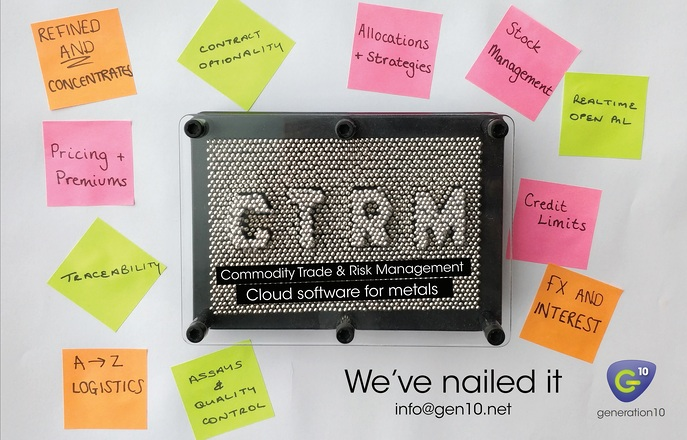In this instalment of our Work Better. Together series, we are exploring how software can help refined metals and concentrates traders reduce operational risk, improve efficiency and reduce errors and omissions.
Using technology to automate business processes and to share data between business units allows organisations to facilitate an environment where risk management policies and standard operating procedures combine to create operational efficiencies; resulting in reduced risk, more efficient processes and ultimately, greater profitability.
Regulations and compliance
Even after country and supplier approvals have been secured, ensuring that a trade is compliant can take significant time and effort. Gen10’s Contract.Manager app helps by highlighting potential issues in the earliest stages of the trade; saving the time taken to gain approvals, presenting better optionality and ensuring compliance as the trade progresses. For example, traders can instantly see a client’s credit line and insurance limit, and check whether each trade meets the pre-approval conditions defined by the risk management team.
This built-in compliance also extends to the operations teams, with actions including generating shipping schedules and transport requests taking place within the system. Any compliance issues such as missing certificates are therefore raised immediately and records are automatically updated, reducing the risk of errors and omissions whilst ensuring compliance and accelerating processes.
Auditing and proving compliance, for example with ISO 9001:2015, can also be improved by using a system that incorporates risk management; both by demonstrating that compliance is a core part of all operations, and by making it easier than ever to review and refine processes.
Workflow management
Gen10’s unique Workflow Engine allows you to better manage operational risks by creating standardised sequences and control measures for transactions to follow, depending on your own existing standard operating procedures and processes. The workflow tool uses the principles of Robotic Process Automation (RPA) to process transactions and communicate data across different IT systems. Reducing the need for manual data entry through the automation of shipping instructions, invoices and more helps to improve traceability and compliance whilst reducing errors and processing time.
The Workflow Engine gives you control and flexibility over every step of the process and workflows can also include role-based rules. So, integrating risk controls doesn’t have to mean that processes are slowed down; instead each transaction can be accelerated by automatically channelling issues to the people able to resolve them. Importantly, this can prove to system users that compliance does not have to mean rigid, cumbersome processes, but that it can help them perform better and faster.
The goal of workflow management is to improve the efficiency of operations whilst managing risk as standard by ensuring all teams have the information they need and risk management occurs as part of the everyday flow of work, including by automating pre-approvals and approval requests. Managing your workflows through Gen10 apps allows you to automate many time-intensive, repetitive processes, so that your operations teams can move faster and with fewer errors.
Cash flow protection
Gen10 apps allow you to protect your cash flows through real-time position reconciliation that updates throughout the day as each trade progresses. Risk management dashboards are also readily available to all who need them, providing instant views on exposures to credit, counterparty, country and other risks. By providing clear, auditable information that traders can use for faster, more compliant decisions, fewer demands are made on risk management and compliance teams.
Further protect your cash flows and reduce your liquidity risk by ensuring your processes are followed faster and with less risk of human error. Automatically include your payment terms in your shipping schedule, and update the affected office functions when shipping schedules are adjusted. For example, finance teams can be automatically updated on the associated liabilities and payment deadlines without operations teams manually getting involved.
Access to funding
As banks continue to face tighter regulation, their compliance demands on commodities businesses are also ever-increasing. Transparency, reporting and verification are all more important than ever, and their significance is only likely to increase in future. Gen10 apps are collaborative by design, allowing you to automate data-sharing with external partners as well as internal teams so you can automatically create and email documents within your workflows.
And within the business, the faster and more accurately information flows between operations, finance and traders, the better access to funding your traders have. By creating efficiencies in your process and reducing the risk of errors and omissions, you can finalise payments and access funding faster. Finance teams have better access to the information they need to arrange a credit line, and traders have instant visibility of the credit available to each customer as it changes.
Due diligence
Keeping records of due diligence activities is a vital part of demonstrating compliance with a range of regulations, and equally importantly, can help your processes become more efficient:
- Your team can ensure that due diligence is being observed at all stages of the trade, for example in ensuring that operations teams don’t allow any shipping until the buyer has signed a contract.
- Accurate and timely Know Your Counterparty (KYC) records can also lead to faster turnaround times through all areas of the business understanding the customer’s credit lines, payment terms and potential barriers.
- As well as preventing risky actions, Gen10 apps can highlight areas where action can be taken, with alerts and notifications based on certain events such as a contract not being returned within a given timeframe.
- With Gen10’s Commodity Manager you have powerful due diligence reporting tools and the ability to group reports so that you can identify where your risks lie; if one customer is consistently slower to ship or one bank is slower to release goods, you can step in and improve the process.
- Comprehensive audit tools mean that if something does go wrong you can discover exactly where the problem lies and correct your processes and controls. Workflows can include approval stages to catch errors before the transaction is completed, and managers/auditors can view a full log of every change to each contract for in-depth auditing.
Compliance without the right systems in place to support it can sometimes come at the expense of efficiency, with risk management policies creating more manual tasks. However, the right compliance system allows operational risk management to be incorporated into the daily flow of work and helps operations teams perform faster and more accurately. With the right compliance system, risk management is incorporated into standard operating procedures, and both are reflected and enforced by the system, driving profitability as well as compliance.
If you enjoyed this article, find out more about how Gen10 apps can solve other complex challenges in metals and concentrates.
Want to read more?
Subscribe now for monthly updates
By submitting your details you agree that we can store your data and communicate with you. You can opt out of these communications at any time. Read all in our Privacy Policy.




